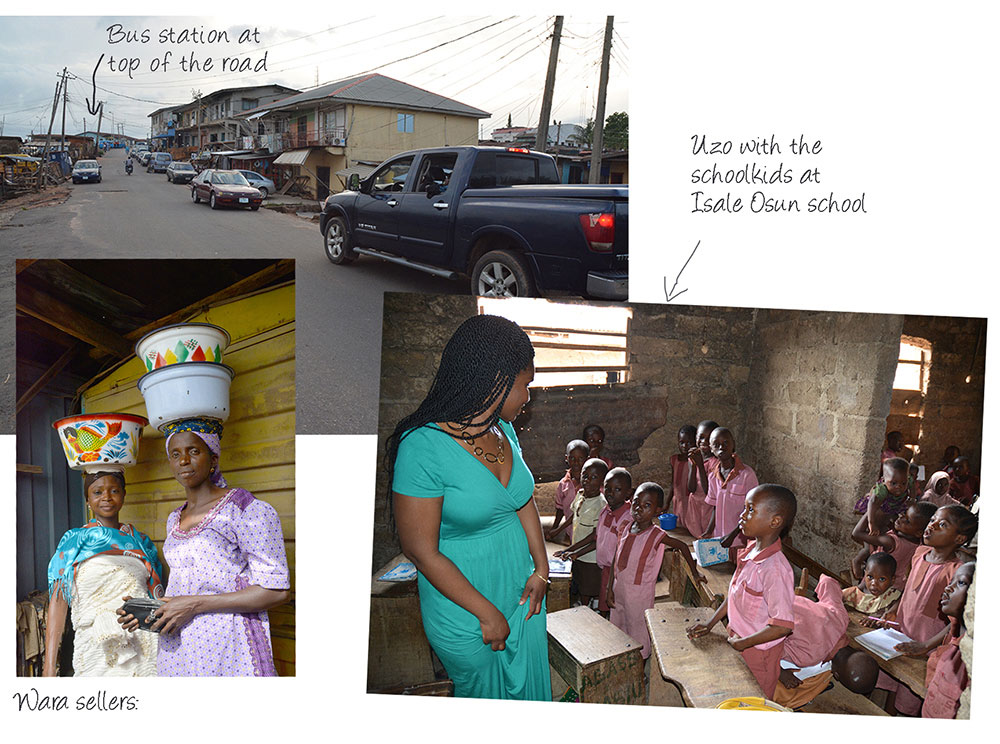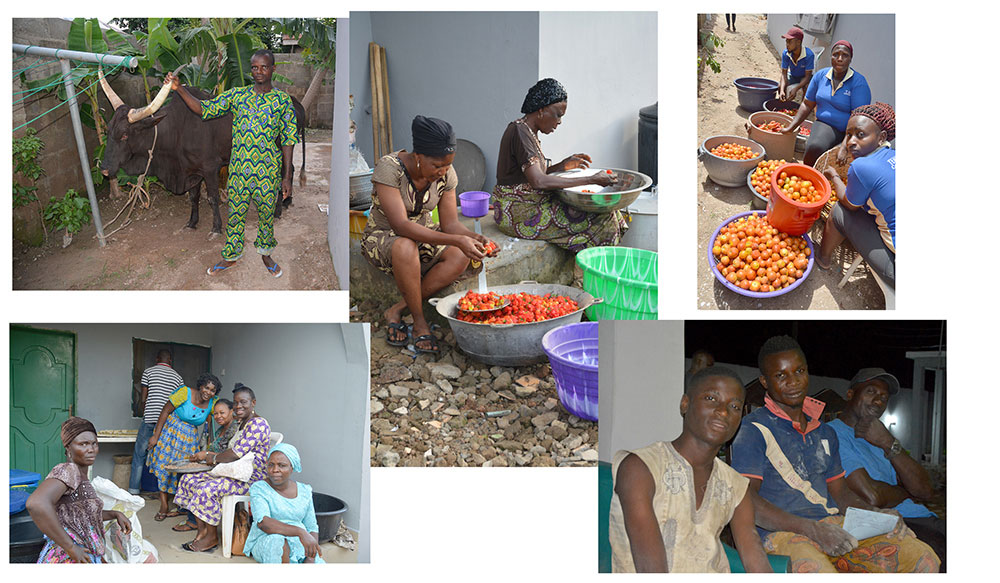This morning the generator outside the window wakes me. When it stops, I can hear the long heavy trumpet sound of the (infrequent) train announcing its departure. There are no barriers or fences along the line, unlike in the West, and folk and livestock wander freely across the narrow gauge track going about their business. We bump over the line every trip into town. The grass grows in between the silver rails, and the litter billows up and settles as the heavy diesel locomotive rumbles on by, exhaust blowing blue in the heat haze.
I make my way to the kitchen, stepping over Austin and Ibrahim who are still sleeping in the darkened, open-plan dining room on a mattress and rolled up blanket. Ibrahim is muslim, and has the distinctive slightly hooked nose and dark complexion typical of Northern tribes. He drives, and is employed by Sister Jumoke as a handyman/general assistant, and has been brought down to Osogbo to help out. Many hands make light work. As I step outside, coffee (with fantastic, distinctively flavoured and near black local honey) in hand, I try my Yoruba with the boys. They like to try their English, and after hand slapping, finger-popping greetings (I rarely get the last ‘snap’ right) there is usually a few questions about the UK, and what it’s like outside Nigeria.
In the garden opposite, behind a high fence, are palms and masquerade trees, plus some other broad-leaved species. Some Grey Plantain-eaters, a type of Turaco, flap as if in slow motion into the top of a fruiting palm. We will be visiting the gentleman resident here with an invitation in the next few days.
It’s getting busier and the pressure is on, in an obvious way. The boys laying the stone on the driveway/courtyard, breaking stone up by hand and setting in dry mix concrete, have their work cut out. There are more boys to help, recruited by Ade. There are problems just when you don’t need them – isn’t that always the way? The big Nissan pick-up needs a tyre, and we are unlikely to get one of the right size today, it will have to come from out of town. This truck is dark navy blue, and I have an idea that people often think we are a government vehicle, such is the similarity, that we are often given a wide birth with it!
Baba’s Youngest son Ayo and senior son Segun arrived from Abuja last night. Segun is busy writing for the Order of Service and Celebration of Life booklet. It will be in English and Yoruba, and as usual with these things, running more than a little behind schedule. After all, there is a deadline! With Jumoke’s daughter Uzo arriving from Baltimore USA, and Toyin’s two younger sons Zack and Daniel arriving from the UK today, it will be busy. Out with Lalu and Maureen, we are sending packages from one of the bus stations in town. Seemingly chaotic with the blue suzuki mini-buses coming and going, parking at all angles on the deeply rutted bare earth yard, the man in charge behind his shuttered kiosk window barks instructions. He knows everything. All the destinations and numbers of the buses are handwritten on a well-worn chalk board on the wall next to the window, and I have no doubt it all runs smoothly despite the chaotic appearance!

On our way into town I see a small boy rolling a tyre along with a stick. Timeless. Some other uniformed schoolboys call out as we drive by, calling me a “white black man” as they see I am in native dress and fila, a reply in English and wave goes down well, all good natured.
After the usual business of the day we buy some Wara from the girls we see regularly. They know us by now and give us first opportunity to buy from them. I have permission to take their photograph (Back home later in the year, I turn these into paintings on canvas). Suraju has been asking us for a picture of him and me, and when we get some prints made as a surprise, he is really chuffed. He invites me into his tiny wooden house in Isale Osun to see where he will place it. On the wall next to pictures of family members, I am honoured indeed. I travel the last mile of the journey back to the house with 40 eggs in a thin plastic bag on my lap. This time I manage not to break any, despite the deep potholes!
This evening we settle Uzo, Zack and Daniel into their hotel nearby, and have a drinking session on the verandah, a little bitten by the mozzies. We return up the hill to our house at nearly midnite. An old boy guards the wooden pole barrier that is lowered, and as he lifts it for us I see he has a hunter’s shotgun over his shoulder. No deterrent if you are determined, but comforting to note there is some community spirit.
Next morning I have a Guiness hangover, but I can blame my grouchy mood on the malaria tablets (so the small print says). With Uzo and Maureen, we visit the churchyard where Baba will be buried at the First Baptist Church, Oke Okanla, and the family house at Isale Osun, where we visit the school opposite the house for the first time. The kids are understandably unsure of what is happening – who are these people? They are sharing books and pencils between them, and Uzo is a little shaken by their lack of resources. Keen to help somehow, this we do on our last day here, more on that later.
Back at the house, two of the three cows arrive to be slaughtered, Halal style. The boys working so hard on the drive get really upset as the cows are walked across the wet concrete and a lot of shouting ensues, a fight breaks out and a machete is raised in self defence by a wide eyed boy. Bloody hell! Fortunately the situation is diffused, but for a moment there it was looking seriously dodgy.

There are some guests arriving for the celebrations already, and introductions, handshakes and group photographs are ongoing. Some people have not seen each other for years, after all.
The slaughterman readily poses with ‘cow number one’ for me, and round the back of the house, catering supplies and all sorts of pots and pans, some the size of witches cauldrons, are being prepared. The slaughter man has his well-worn but hopefully sharp knives laid out neatly on top of a barrel. A big fire is lit. A group of ladies are preparing vegetables and peppers for the cooking up, and are singing and chanting. They will go on all night and into the morning. All of the boys are still here, some are bunked down for the night. In the lamplight, I chat with Oscar and Sikiru about the West, and food production, meat slaughter, packaged food, organic food, supermarkets. The differences between cultures, but all governments have agendas etc.
There is a definite sense of occasion, tense and exciting at the same time, like watching a clock ticking just before the alarm goes off. Tomorrow is a big day. The Wake keeping begins. First though, will be cow number one.
Poor cow, it can tell what is going to happen by the look on its face…
Yes I watched the process, Next post will have more of a description, won’t post pictures of it though